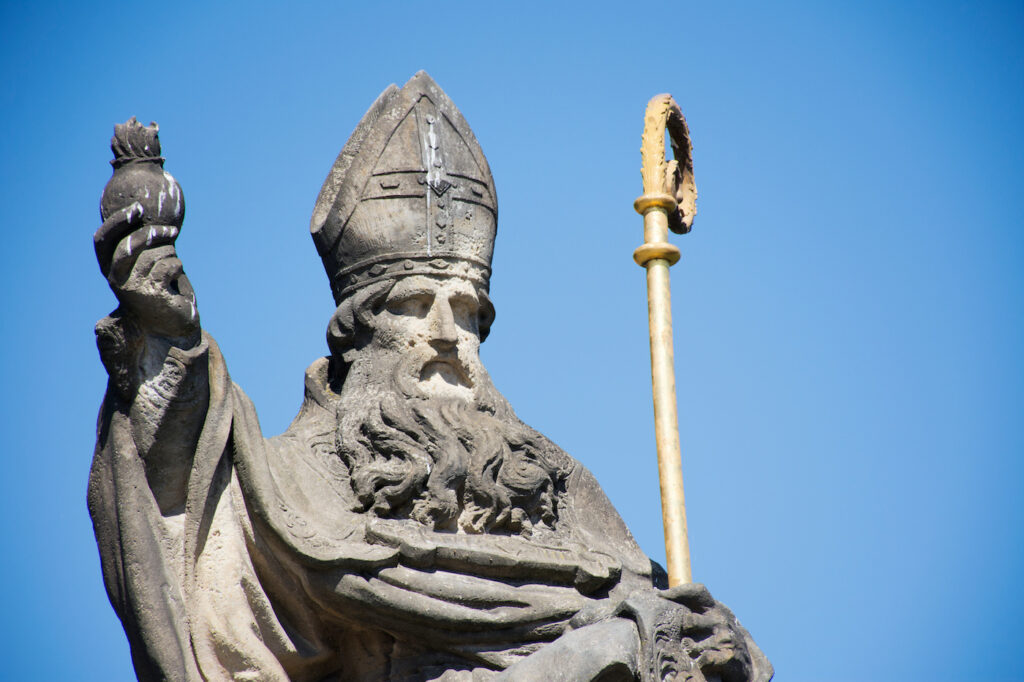In the past twenty years, the rhetoric of hope in American politics has fallen out of favor. The first decade of this century featured John Edwards’s convention speech declaring that “hope is on the way” and Barack Obama’s “hope and change” campaign. Many expected that we were helping the arc of history bend a little faster towards justice.
But in retrospect, it seems like hope never arrived. Instead we got American carnage, Democracy dying in darkness, and critical theories about structural racism. We have a rhetoric of gloom if not despair. We went from the optimism of The West Wing shaping our political imaginary to the cynicism of House of Cards. With this prevailing mood, Michael Lamb’s A Commonwealth of Hope: Augustine’s Political Thought is an important intervention not only in Augustine studies, but also in our politics of stagnation and hopelessness. I will address the former first and then consider how it might offer hope and guidance for us in the realm of political life.
Augustine the Pessimist?
Lamb lays out the standard interpretation of Augustine: he is an otherworldly pessimist. Nothing in this life gets better, and nothing in this life is worth loving. Our hope is in the next life; this life is only good for getting us there. For Lamb, this is how Augustinian realists interpret the great saint’s thought. The earthly city is thoroughly wicked, and we better get used to facing that. Whereas the realists have no hope for virtuous political life, the Augustinian communitarians think that virtuous political life can take place within the pilgrim city, which is the Church. Only the Church is capable of midwifing political improvements, according to the communitarians, so it’s best to join these pilgrim communities heading for the exits. Meanwhile, most liberal theorists think Augustine offers nothing constructive for our political life. For the liberals, we can have a sunnier political life if we stop treating politics like a doomed endeavor as Augustine does.
Start your day with Public Discourse
Sign up and get our daily essays sent straight to your inbox.These different interpretations of Augustine often depend on highly selective readings of his work. But a growing number of Augustine scholars (such as Lamb, but also Eric Gregory, Veronica Ogle, Joshua Nunziato, and Robert Dodaro) are questioning this selectivity. The selective readings offer a false vision of both Augustine and the relationship between the pilgrim and earthly cities. Looking beyond some of the standard texts of the Augustinian corpus, Lamb turns our attention to sermons, letters, and catechetical pieces to flesh out an Augustine beyond the doom and gloom.
Lamb points to an Augustine who is hopeful. This Augustinian hope is connected to love. For Lamb, Augustine develops an order of loves in which our love of God does not negate love of other people and other things, but rather conditions and shapes these loves. Likewise, hoping in God for our entrance into the heavenly city does not mean we cannot hope in God for our earthly city. With both hope and love, we need to get things in the right order so we can act rightly. The Augustinian vision that Lamb presents means that when we love or hope for something else more, we do not cease loving or hoping for the lesser thing; rather, by loving and hoping in God first, we are able to situate our hopes and loves the right way.
Augustine develops an order of loves in which our love of God does not negate love of other people and other things, but rather conditions and shapes these loves.
Hopeful Rhetoric
Along these lines, Lamb brilliantly shows how Augustine uses rhetoric to move his listeners toward the right order of hope so that they can act rightly in the world. Augustine’s commitment to rhetoric—to finding the available means of persuasion and applying them—only makes sense because he thinks that persuasion can bring about change. Augustine’s attempts at persuasion indicate his hopefulness: you can’t write and speak as much as Augustine did without hoping for at least marginal improvement.
Lamb ably directs his readers to see Augustinian rhetoric as a form of spiritual exercise meant to develop the listener’s ability to hope in the right way, for the right things, and in the right God. Hoping rightly, we can work in and for the pilgrim city and for earthly cities. Augustine’s descriptions of life’s evils and turmoil should awaken us to life’s uncertainties, our lack of self-sufficiency, and our need for mercy. But for Lamb, these descriptions can’t be separated from Augustine’s depictions of the beauty of this life, which are meant to remind us that goodness and peace are deeper and more real than evil and strife. Both Augustine’s dark and bright renderings of this world guide us to hope in the good that we only partially perceive and can only partially attain. We can partially attain, and so should work to attain, the good of this life.
Emphasizing Augustine’s rhetoric allows Lamb to show the Augustinian navigation between presumption (which expects too much from or for ourselves) and despair (which expects nothing from or for ourselves). For Augustine, hope is the middle way between these errors in part because it is less self-referential than either. We do not get much certainty in this life (contra both the presumptuous and the despairing). But we can hope that the good we partially perceive can be partially realized here and now, and it will be fully known in the next life. Our deepest hope lies in God, but our lesser hopes can also be in ourselves and in others. Just as we love our neighbor as we love ourselves, so too we hope in our neighbor as we hope in ourselves. For Lamb, in hoping in God, we can have the moderate and reasonable hope in others that does not make them idols. When we make idols out of politicians or political causes, they will inevitably fail us. But when our hope in them in mediated by a greater hope in God, we can do the work our communities need from us.
Augustine’s attempts at persuasion indicate his hopefulness: you can’t write and speak as much as Augustine did without hoping for at least marginal improvement.
However, I worry that Lamb is too quick to steer us away from the otherworldly. The focus and direction of this life is the heavenly city. The only real commonwealth in this world is the pilgrim city. Lamb is right that wayfarers can and should care for the way. Hikers en route to the summit should improve the trail for themselves and others, clear and clean the campsites on the way, and help those they meet. They do so, never forgetting the summit they aim for. Likewise, Lamb shows that Augustinians should work for earthly peace and worldly justice. And yet, he occasionally downplays the otherworldly as our proper home when he is trying to restore Augustine’s this-worldly concerns. Along these lines, his critique of Augustinian communitarians for excessive preoccupation with the church as an alternative community seems to forget just how much time Augustine spent on ecclesial matters. Yes, he intervened in political life, but most of his time was spent on building up the pilgrim city. Augustinian communitarians might reject the political too much, but Augustine certainly prioritized the ecclesial more that Lamb indicates.
Nevertheless, Lamb’s work provides an important intervention in political thought today. He helps us navigate between the extremes of presumption and despair. Lamb’s depiction of Augustine’s political agency is important because it illustrates what hope in action looks like: in his political endeavors, Augustine was not presumptuous and did not aim for a total transformation of this life—but neither did he despair of making life better. Lamb discusses Augustine’s political efforts, which generally took the form of intervening with political leaders on behalf of the poor and imprisoned or admonishing his congregation to a more equitable distribution of goods. Augustine counseled one political leader not to abandon political life for the monastery. He presided over a bishop’s court tasked with doling out justice in a world of rampant corruption and strife. Lamb corrects the supposedly apolitical and otherworldly view of Augustine, showing that he was actively engaged in the political sphere to make this life a little better. The supposed pessimist hoped enough in this life to improve it, especially for the sake of the smallest and most forgotten among us.
A Hope That Works
This is why Lamb’s book is well suited for our times. The soaring rhetoric of political hope offered by Obama, Edwards, and Jed Bartlet leads to disappointment. Promising too much, presumption inevitably ends in despair. Despair, in turn, leads to a cynicism that leads to endless political posturing with little actual political action. Politics in this earthly city is rarely transformative, but it can be reformative. We can and should make life more just, equitable, and loving. We can “improve public life in ways that were meaningful for many who were vulnerable to its worst effects,” as Lamb puts it. We can, in this life of weal and woe, make things a little less hard, a little more merciful, a little more peaceful as Augustine did.
In this, Augustine—and Lamb’s thoughtful scholarship on him—provide us with a model for hope in our times and guidance for how to live that hope. This will include the hard work of political engagement to make our republic a safer place for the weak and neglected. It entails compromise between people who hold different first principles in order to lessen social and political evils. Lamb suggests that living an earthly politics of hope includes “working on behalf of the poor, advocating for societies’ most vulnerable, preserving the rule of law, diagnosing the lust of domination, talking with neighbors, building coalitions with local leaders, and participating in activities that unite citizens around common hopes.” Sometimes this will mean voting, more often it will mean joining the group that helps clean up the local park or helping at your parish’s food drive.
We work because we hope: the more reasons to hope, the more reasons to work. Lamb gives us reasons to work by showing how Augustine hopes. Presumption and despair do not make the world a better place. They just leave us with TV shows and empty convention speeches.
A hope that works, that is aware of hardship but still sees this life’s goodness in the light of the God who is the Good, can make life a little better for the denizens of our various earthly cities. That hope might just be the leaven for healing and point to goods higher than any this world can offer.














